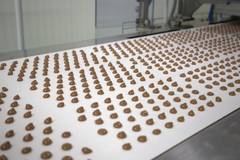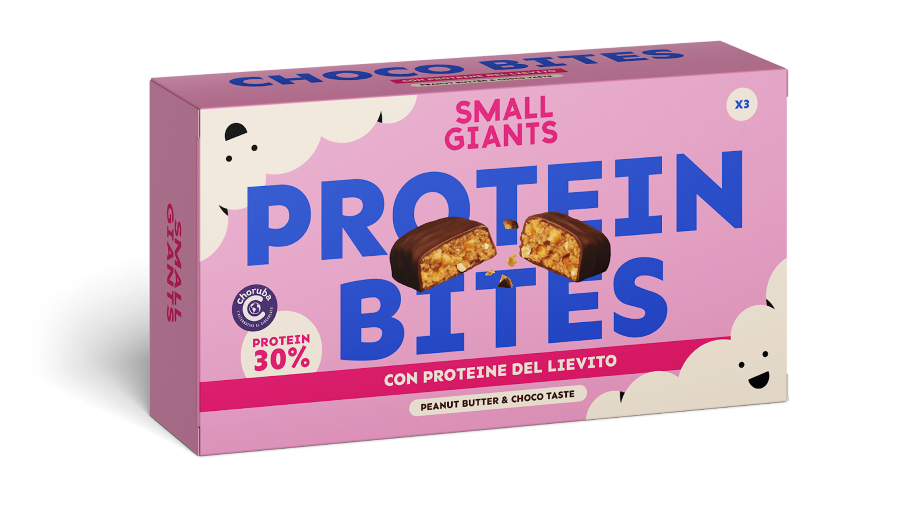
- Industry news
Industry news
- Category news
Category news
- Reports
- Key trends
- Multimedia
- Journal
- Events
- Suppliers
- Home
- Industry news
Industry news
- Category news
Category news
- Reports
- Key trends
- Multimedia
- Events
- Suppliers
Foreverland scales chocolate alternatives with new production facility and retail launch
Key takeaways
- Foreverland’s Puglia facility boosts Choruba output to 500 metric tons annually, enabling industrial trials and a reliable supply.
- Choruba offers cocoa-free chocolate alternatives with lower environmental impact, helping brands meet sustainability commitments amid supply challenges.
- The partnership with Small Giants brings vegan, high-protein snacks to supermarkets, signaling mainstream readiness for sustainable chocolate innovations.

Italian food ingredients company Foreverland has opened its first production facility in Puglia, Southern Italy. The move marks a significant step forward in Foreverland’s growth strategy of producing sustainable chocolate alternatives.
According to the company, the new facility will produce over 500 metric tons of its flagship ingredient, Choruba, annually.
Choruba has applications across various products and is designed to help food manufacturers navigate cocoa market challenges and achieve sustainability targets. The ingredient delivers the same indulgent flavor and mouthfeel as chocolate with a significantly lighter environmental footprint.
The facility will enable the company to run industrial trials with larger clients, secure small and medium-sized business customers, and deliver a steady, scalable supply of cocoa-free alternatives.
Furthermore, a pilot fermentation room is adjacent to the facility, enabling the team to test and refine processing stages flexibly.
Expanding into food retail
Alongside its new plant, Foreverland has announced a fourth partnership in food retail.
Teaming up with Italian protein innovators Small Giants, the duo launched Choruba Protein Bites — peanut butter and chocolate-flavored snacks produced using Small Giants’ yeast-based protein and coated with Foreverland’s cocoa-free chocolate alternative, Choruba.
Priced at €3.29 (US$3.84) for a three-pack or €1.99 (US$2.32) for a single bar, the vegan, high-protein, sustainable snacks are available online and in-store across the Gulliver supermarket chain.
Foreverland’s flagship innovation, Choruba, addresses both consumer expectations for indulgence and the cocoa sector’s rising sustainability challenges. Choruba also helps manufacturers navigate a market facing record price volatility, supply shortages, and climate pressures by reducing reliance on cocoa.
Looking ahead, Foreverland is discussing expanding into France and the Nordics, building on its presence in Italy and Germany.
Food Ingredients First speaks with Massimo Sabatini, co-founder and CEO of Foreverland, to find out more about the new facility and how it might impact cocoa supply chains and the wider F&B industry.
How do you anticipate the launch of the Puglia facility and scalable Choruba supply will influence the adoption of cocoa-free chocolate alternatives across Europe?
Sabatini: The Puglia facility launch marks the moment we move from pilot projects to full-scale production. The plant will allow us to work hand in hand with manufacturers, speed up recipe development, and bring sustainable chocolate alternatives into everyday products across Europe — all while ensuring we can meet demand at accessible price points. Our partnership with Small Giants is a strong example of this next phase, showing how sustainable chocolate alternatives are ready for the mainstream.
Another goal with the facility launch is to make Choruba the easy, obvious choice. As our production scales, we can offer even more competitive pricing, making us a real challenger in the industrial supply of both chocolate and cocoa-free alternatives. We are not only cost competitive, with the increased volumes of production we can now sustain, we’re able to supply larger manufacturers with a steady and reliable source of sustainable chocolate alternatives.
 Small Giants and Foreverland have jointly launched Choruba Protein Bites — peanut butter and chocolate-flavored snacks.The presence of our on-site R&D lab also allows us to customize solutions for our partners. To support these claims, we have already run several industrial trials with European manufacturers in the past few months.
Small Giants and Foreverland have jointly launched Choruba Protein Bites — peanut butter and chocolate-flavored snacks.The presence of our on-site R&D lab also allows us to customize solutions for our partners. To support these claims, we have already run several industrial trials with European manufacturers in the past few months.
In what ways could Choruba’s reduced reliance on cocoa affect sustainability targets and sourcing strategies for chocolate and confectionery manufacturers?
Sabatini: We are not trying to replace high-quality, carefully sourced cocoa. Our vision for Choruba is to help fulfill the growing gap between product demand and actual supply. As the world’s appetite for chocolate grows and climate change impacts cocoa production, we offer a climate-stable, sustainable alternative. This is particularly relevant in products where chocolate drives the characterization of a product but is not the only ingredient, such as coated bars or biscuits, filled wafers, or glazed pastries. The climate benefit of switching from conventional chocolate to Choruba in these products can be significant and would also help manufacturers better navigate, or avoid, cocoa supply challenges.
How might the ability to run industrial trials with larger clients accelerate innovation and partnerships between ingredient suppliers and F&B brands?
Sabatini: By running industrial trials on a flexible production line, we can quickly test a wide variety of product formats and use cases, dramatically shortening the path from idea to shelf. Those trials let us fine-tune process parameters such as texture, melt, snap, and flow on real equipment, so the learnings translate directly to scale. Most importantly, co-developing with brand partners means we align on the exact requirements of their end customers, turning R&D sprints into market-ready launches with lower risk and higher confidence.
Could the new facility’s production scale and cost efficiencies make sustainable chocolate alternatives more accessible to mainstream markets?
Sabatini: In terms of cost efficiency, we already offer a competitive product that has an edge over conventional chocolate. The synergy between our in-plant R&D lab and our ability to run larger, more frequent industrial tests allows us to develop new, innovative solutions in collaboration with manufacturers while also ensuring a higher-volume, secure supply. This combination of factors positions us as ideal partners for big food manufacturers, opening the door to mainstream F&B markets.
Beyond confectionery and protein snacks, which new product categories could benefit most from Choruba and similar cocoa-free alternatives?
Sabatini: The lowest-friction way to introduce consumers to alternative chocolate is through products where chocolate is a characterizing ingredient but not the sole or main focus. This includes muesli and granola with chocolate chips, baked goods like chocolate-chip cookies, and healthier treats like chocolate-coated rice cakes or granola bars.











